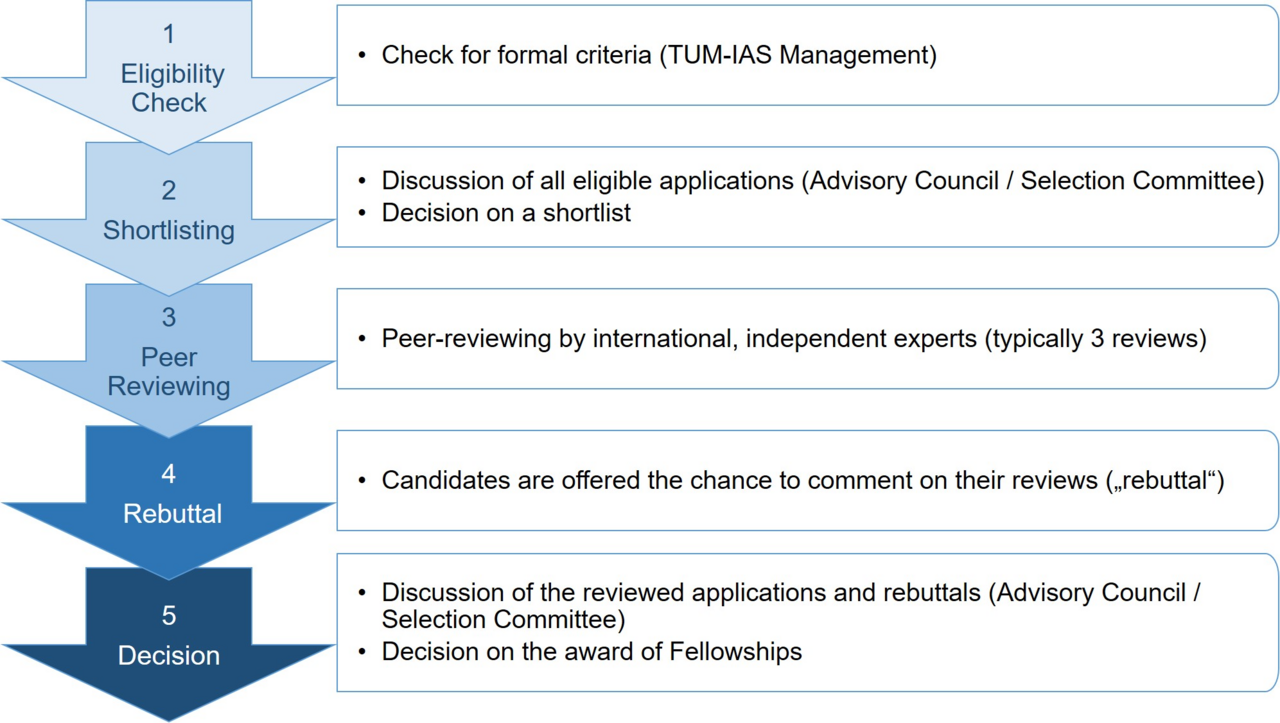Evaluation Process
TUM-IAS follows a strict multi-stage evaluation procedure to ensure the high quality of its Fellowships. The process presented here applies to the Albrecht Struppler Clinician Scientist Fellowship, the Dieter Schwarz Fellowship, the Dieter Schwarz Courageous Research Grant, the Hans Fischer / Hans Fischer Senior Fellowship, the Rudolf Diesel Industry Fellowship and the Philosopher in Residence Fellowship.
The evaluation committee typically involved is the TUM-IAS Advisory Council, consisting mainly of TUM professors, and in case of the Dieter Schwarz Fellowship, in addition of a representative of the Dieter Schwarz Foundation* and a representative of a partner university* of the “Joint Global Research Hub” (Oxford Internet Institute, University of Oxford, Stanford University, Hebrew University Jerusalem, HEC Paris, ETH Zurich).
In case of the Dieter Schwarz Courageous Research Grant, a separate Selection Committee is involved, consisting of representatives of TUM and external experts: TUM-IAS Director, Vice President TUM Campus Heilbronn, TUM Senior Vice President Research and Innovation, a representative of the TUM Heilbronn Data Science Center / Munich Data Science Institute, a representative of The Federal Agency for Disruptive Innovation SPRIND, a representative of the Dieter Schwarz Foundation* and a representative of a partner university of the “Joint Global Research Hub” (Oxford Internet Institute, University of Oxford, Stanford University, Hebrew University Jerusalem, HEC Paris, ETH Zurich). In addition, the Dieter Schwarz Foundation is given the opportunity to propose an additional external member* for the Selection Committee.

Stage 1
All applications undergo a first eligibility check by the TUM-IAS management with regard to the formal criteria of the respective Fellowship types. All eligible proposals are then made available to the Advisory Council (or in case of the Dieter Schwarz Courageous Research Grant, the Selection Committee).
Stage 2
The Advisory Council (or in case of the Dieter Schwarz Courageous Research Grant, the Selection Committee) comes together to review and discuss all proposals and advises the TUM-IAS director which proposals to put on a shortlist.
Stage 3
All shortlisted proposals are peer-reviewed by international independent experts (for more information, see page 25) in the candidates’ respective fields of research. A number of experts have been suggested by the candidate, others have been selected by TUM-IAS. All peer reviewers receive a detailed questionnaire with which to structure their review in order to ensure a maximum of comparability despite the multidisciplinary nature of the proposals.
Stage 4
The anonymized peer reviews are sent to the candidates for commenting (“rebuttal”) to ensure a maximum of transparency for the candidates and their hosts.
Stage 5
The Advisory Council (or in case of the Dieter Schwarz Courageous Research Grant, the Selection Committee) comes together for a second time to review the shortlisted applications as well as the reviews and their rebuttals. On this basis, the Advisory Council (or in case of the Dieter Schwarz Courageous Research Grant, the Selection Committee) recommends to the TUM-IAS director which Fellows to appoint (taking budgetary considerations into account).
* Without voting rights.
Conflicts of Interest
All shortlisted applications/nominations are evaluated by independent reviewers. In order to ensure that there is no actual or potential conflict of interest, we must ask any reviewers to refrain from evaluating the proposal if the following circumstances apply:
- First-degree relationships, marriage, life partnership, domestic partnership with the applicant/nominee and/or host.
- Personal (financial) interest in the proposal’s success or (financial) interest by persons listed under no. 1.
- Current (within the past three years) or planned close scientific cooperation with the applicant and/or host.
- Dependent supervisory relationship (e.g. teacher-student relationship up to and including the postdoctoral phase) with the applicant and/or host, extending six years beyond the conclusion of the relationship.
- The affiliation or pending transfer to the department or to the non-university research institute of the applicant/nominee or host.
- Any other situation that would compromise the ability to unbiasedly evaluate the proposal.